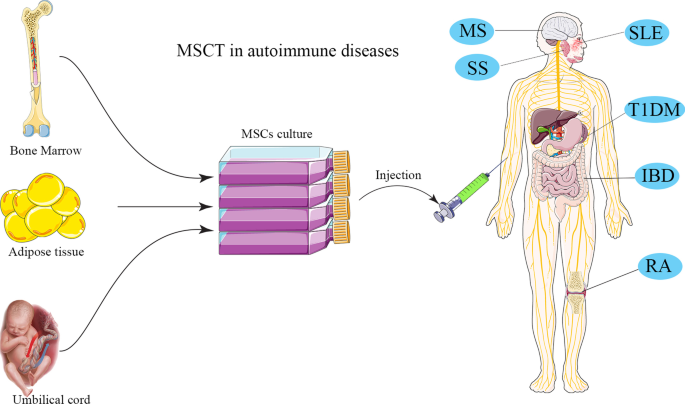Regenerative Medicine For Multiple Sclerosis Things To Know Before You Buy
The smart Trick of Regenerative Medicine For Multiple Sclerosis That Nobody is Discussing
Table of ContentsThe Only Guide for Regenerative Medicine For Multiple SclerosisRegenerative Medicine For Multiple Sclerosis Things To Know Before You BuyA Biased View of Regenerative Medicine For Multiple SclerosisSome Ideas on Regenerative Medicine For Multiple Sclerosis You Need To KnowThe Single Strategy To Use For Regenerative Medicine For Multiple SclerosisExamine This Report about Regenerative Medicine For Multiple SclerosisNot known Facts About Regenerative Medicine For Multiple Sclerosis
The mesenchymal stem cells hair transplanted during stem cell therapy can divide and grow to create new cells that can replace the harmed cells of the anxious cells. This may bring back neurological features in people with this problem. These benefits of stem cell therapy are further sustained by the ability of MSCs to promote healing.People with multiple sclerosis are generally treated with mesenchymal stem cells. These are multipotent stem cells that have the capability to set apart and grow to create a wide variety of cell key ins the body. Once transplanted, these stem cells can create to form healthy and balanced nerve cells hence supporting the regeneration of the damaged cells of the anxious system.
When transplanted, the stem cells migrate to areas of swelling or damages within the main nerves (CNS). They are normally drawn in to the websites of injury where the body immune system is striking the myelin sheath, the safety treatment of nerve fibers. The stem cells function by advertising the repair service and regeneration of harmed myelin, potentially restoring function to impacted nerve cells.
More About Regenerative Medicine For Multiple Sclerosis
Stem Cell Research on MS The National Multiple Sclerosis Society, along with various other companies, is actively moneying and sustaining research study into mesenchymal stem cell therapy for several sclerosis to explore their prospective and boost therapy protocols. The goal is to establish more secure and more reliable means to make use of stem cells in treating MS.
Regenerative Medicine For Multiple Sclerosis - Truths
Here are reviews from patients of individuals Swiss Medica clinic. The client traveled from Romania looking for therapy for MS after listening to positive feedback regarding stem cell treatment for the disease.
Obtain a totally free online appointment to discover just how stem cells will function for your instance, and what are the period and cost of the treatment. Uccelli, A., Laroni, A., Brundin, L., Clanet, M., Fernandez, O., Nabavi, S. M. Regenerative Medicine for Multiple Sclerosis., Muraro, P. A., Oliveri, R. S., Radue, E. W., Sellner, J., Soelberg Sorensen, P., Sormani, M. P., Wuerfel, J. T., Battaglia, M
Stem cells are cells in the body that can mature into grow right into that serve a specific function. There are 2 major types of stem cells: beginning stem cells and adult stem cells.
are found in some adult cells and body organs including the bone marrow, skin, blood, and brain. Grown-up stem cells are not as adaptable as embryonic stem cells and are for that reason much more limited in terms of the kinds of cells they develop into. The unique residential or commercial properties of stem cells supply assurance for brand-new therapies that can slow/halt MS condition activity and repair cells damage in the central nerves.
The Regenerative Medicine For Multiple Sclerosis Diaries

The procedure includes gathering stem cells from a person's own (autologous) bone marrow. The person is then treated with radiation treatment to deplete the body immune system and stem cells are reintroduced into the body where they mature right into brand-new, healthy and balanced immune cells - Regenerative Medicine for Multiple Sclerosis. Stem cells can be infused into the body in different methods

In 2000, the MS Culture of Canada and MS Scientific Study Structure moneyed a scientific trial including HSC transplants, led by Drs. Mark Freedman and Harry Atkins from the Ottawa Medical Facility Research Study Institute/University of Ottawa. The aHSC therapy offered in Canada is a therapy that makes use of high-dose radiation treatment, likewise called conditioning.

A Biased View of Regenerative Medicine For Multiple Sclerosis
Neural stem cells (NSC) are located in the brain and can mature into numerous sorts of brain cells Learn More Here including neurons, oligodendrocytes, and astrocytes. NSCs might serve to fix or shield the mind and regulate the immune system. Early professional tests in non-human primates demonstrated that therapy with NSCs benefitted the progression of MS-like condition in animal models.
The arise from these security researches declare for future stem cell and regenerative medication therapies in MS. Future clinical tests (phase 2 and 3) with larger varieties of individuals and controls are needed to assess the efficacy of this therapy for MS. As shown by the examples above, there is a vast range of research study happening that will certainly give extra solutions concerning the usage of stem cells to treat MS.
Stem cell treatment is considered safe, but, like any kind of clinical treatment, it carries some risks, such as short-term swelling or discomfort at the injection website. Nevertheless, severe side results are rare when done by qualified dig this specialists.
The Best Strategy To Use For Regenerative Medicine For Multiple Sclerosis
Numerous sclerosis (MS) is a chronic illness of the main nerve system that influences the mind and spine cable. It is characterized by the deterioration of myelin, a material that covers nerve fibers, causing disturbances in communication between the brain and the rest of the body. Symptoms can vary commonly and consist of muscle weakness, vision troubles, imbalance, and fatigue.
Multiple sclerosis is characterized by the body immune system wrongly striking the safety sheath (myelin) that covers nerve fibers, creating communication concerns between the mind and the remainder of the body. The disease can result in the damage or permanent damages of nerves. Signs and symptoms vary widely among individuals and can consist of fatigue, mobility concerns, discomfort, and cognitive adjustments.